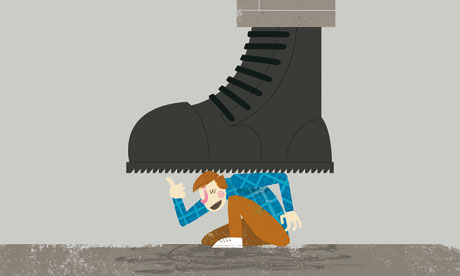
Not long ago, in an interview conducted at his home – the Butner Federal Correctional Institution, in North Carolina – the convicted fraudster Bernie Madoff said something surprisingly profound. "I have… no decisions to make," Madoff, who's scheduled for release in 2139, told Barbara Walters. "I know I will die in prison. I lived the last 20 years of my life in fear. Now I have no fear because I'm no longer in control."
In all honesty, the interview hardly gave the sense he'd seen the light, and I suspect the world's not yet ready for a book entitled The Spiritual Wisdom of Bernie Madoff. (If it ever is, I've got a great marketing wheeze: the first 100 buyers get 80% off; everyone else pays full price, gets no book and never sees their cash again.) Still, his insight's worth mulling. All anxiety stems from the fear that we'll lose what we have, or that the future won't be what we want. It seems rational to quell the fear by winning those battles. But perhaps an equally effective, even preferable, solution might be to lose them, decisively and irreversibly – eliminating the sense of fearful struggle by eliminating the struggle altogether.
That radical notion chimes with a forthcoming study in the journal Psychological Science, about the seemingly bizarre ways people respond to rules. Research shows we sometimes respond to restrictions on our behaviour by rationalising the new rules, in order to feel good about them, while at other times we rebel, pursuing the banned thing with even more vigour. Kristin Lauren and her colleagues at the University of Waterloo in Canada showed that the explanation seems to lie in how absolute the restrictions are. In one experiment, groups of people were told of an impending reduction in driving speed limits; the more it was presented as a done deal, rather than a proposal, the more likely they were to approve of it. The researchers suggest this might even help explain the Arab Spring: under absolute dictatorship, people make life tolerable by rationalising their oppression, but when that dictatorship weakens – as when Tunisia's president fled the country – their rationalisations evaporate and uprisings occur. Alexis de Tocqueville observed that revolutions often happen, counterintuitively, when things are getting better. Perhaps this is one reason why.
As an approach to politics, this leads to some alarming dilemmas, since it seems to imply that absolute tyranny makes people happier than having at least some rights. (And that's not even the most repugnant conclusion: what about slavery?) As personal life advice, though, it's a better argument – for burning bridges and closing doors. "Those with 'something to fall back on'," as David Mamet once put it, "invariably fall back on it. They intended to all along. That is why they provided themselves with it. But those with no alternative see the world differently."
Yet the point here is subtly different from those motivational slogans about how once you commit, you'll succeed. Instead, it's that if you commit, you'll find a way to understand whatever ends up happening as success. You could call this "rationalisation", or you could say that making choices alters the person doing the choosing, and thus their definition of success. In the closing off of possible alternative futures, there's a kind of release – which, unless he lives to be 201, is the only kind Madoff's going to get.
oliver.burkeman@theguardian.com; twitter.com/oliverburkeman

